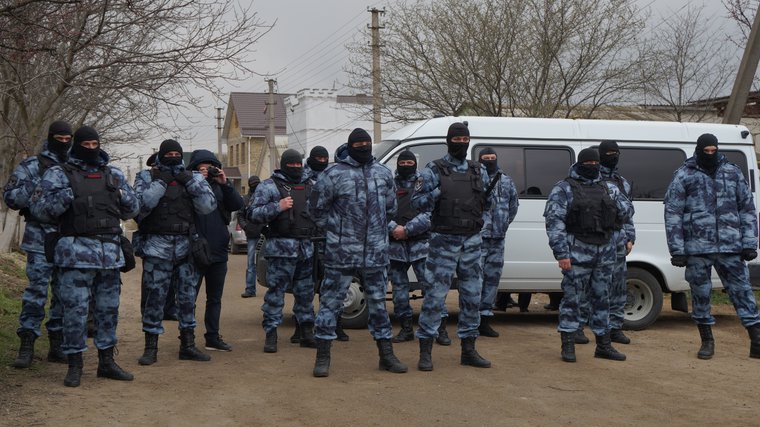The Turkish Foreign Ministry has condemned the latest abuse of Tatar Turks in Russian-occupied Crimea. On Monday morning, 31 August, the Crimean authorities raided the homes of Tatars, detaining an unspecified number of people.
The action prompted the Turkish Foreign Ministry to issue a strongly-worded statement on the same day:
“We are following with concern the raids on the houses of Crimean Tatar Turks and the detentions that took place in Crimea this morning.”
The Ministry described the raids as the latest example of the “systematic oppression and intimidation campaign against the Crimean Tatars.”
The statement added that “Turkey will continue to stand by its kinsmen, Crimean Tatars, who have been defending their rights and interests by peaceful means and trying to make their voices heard through democratic methods.”
Monday’s arrests follow a pattern of repressive action by Russian security forces in Crimea. Armed officials target Tatar communities, carrying out searches in dozens of homes, and arresting and interrogating Tatars on suspicion of “terrorism” because of their resistance to the Russian occupation.
According to the Crimean Tatar Resource Center (CTRC), despite constituting only 11% of the population on the Crimean peninsula, Tatars are significantly over-represented in the total number of people arrested and imprisoned.
In May, Eskender Bariyev a member the Mejlis of Crimean Tatar People and chairman of the CTRC, said in an online briefing that “The total number of arrests in the first three months of this year is 97, including 13 new arrests and 84 extended arrests,” the vast majority being Crimean Tatars.
He cited that ‘24 representatives of the indigenous people of Crimea out of 25 persons detained, 18 out of 28 interrogated…[and] 12 out of 15 searches were conducted in the homes of Crimean Tatars.”

The number of arrests for 2020 show an increase of 23% from the same period in 2019.
The Crimean peninsula is on the northern coast of the Black Sea in Eastern Europe. The territory measures about 10,000 sq miles – slightly bigger than Wales – and is home to diverse ethnic groups. A little over two-thirds (68%) identify as Russian, 16% as Ukranian and 11% as Tatar.
Religiously, research in 2013 found that Orthodox Christians made up 58% of the Crimean population, followed by Muslims (15%) and believers in God without religion (10%).
Russia annexed Crimea from Ukraine in February 2014. While the bulk of Crimeans are seemingly happy at becoming a part of the Russian Federation, Ukraine regards the territory as under occupation. Turkey, the US, and the UN General Assembly also view the annexation as illegal.
The oppression of Crimea’s ethnic Tatars since Russia’s 2014 takeover has been well documented, and Turkey has been vocal about the abuses of its Turkic relations.
In May 2020, Crimean Tatars remembered Stalin’s genocide against them 76 years ago
Historically, the Tatars have faced persecution at the hands of Russians. In May 1944, over 191,000 Tatars were forcefully deported from the Crimea to Central Asia under the orders of dictator Joseph Stalin. Known as Sürgünlik (“exile”), the ethnic cleansing of Tatars lasted for decades, although they started to return to their homeland after Ukraine gained its independence from the Soviet Union in 1991.
The Tatars are a Turkic people indigenous to the Crimea, whose history in the region dates back at least a millennia. Ethnically they are the descendants of the various peoples who have lived in the Crimea, which include the Tauris, Scythians, Sarmatians, Khazars, and Circassians. What binds them is their historical roots to the territory, their Turkic language and Islamic faith.
Main image, top of riot police surrounding Crimean Tatar homes, 27 March 2019. Photo © Crimean Solidarity





